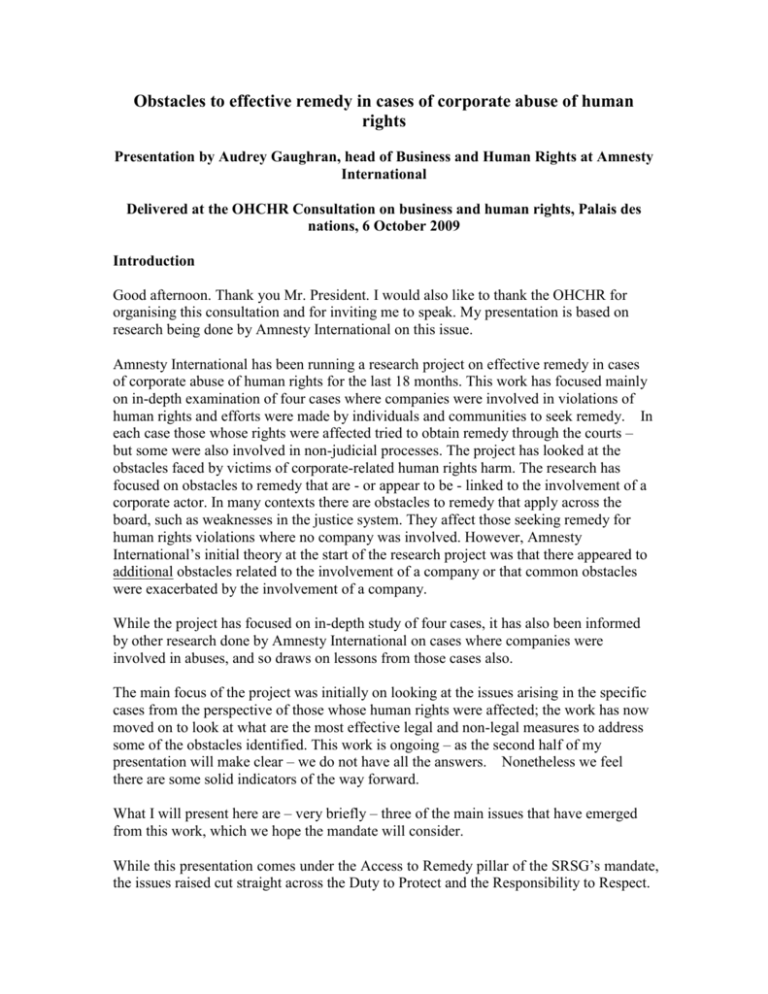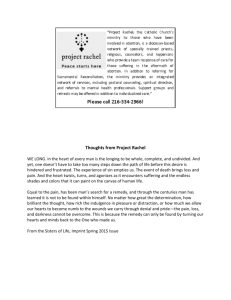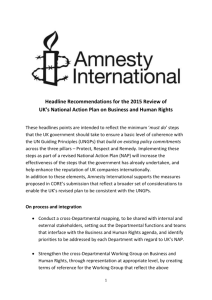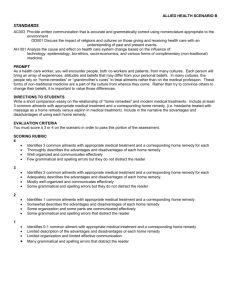Obstacles to effective remedy in cases of corporate abuse of human
advertisement

Obstacles to effective remedy in cases of corporate abuse of human rights Presentation by Audrey Gaughran, head of Business and Human Rights at Amnesty International Delivered at the OHCHR Consultation on business and human rights, Palais des nations, 6 October 2009 Introduction Good afternoon. Thank you Mr. President. I would also like to thank the OHCHR for organising this consultation and for inviting me to speak. My presentation is based on research being done by Amnesty International on this issue. Amnesty International has been running a research project on effective remedy in cases of corporate abuse of human rights for the last 18 months. This work has focused mainly on in-depth examination of four cases where companies were involved in violations of human rights and efforts were made by individuals and communities to seek remedy. In each case those whose rights were affected tried to obtain remedy through the courts – but some were also involved in non-judicial processes. The project has looked at the obstacles faced by victims of corporate-related human rights harm. The research has focused on obstacles to remedy that are - or appear to be - linked to the involvement of a corporate actor. In many contexts there are obstacles to remedy that apply across the board, such as weaknesses in the justice system. They affect those seeking remedy for human rights violations where no company was involved. However, Amnesty International’s initial theory at the start of the research project was that there appeared to additional obstacles related to the involvement of a company or that common obstacles were exacerbated by the involvement of a company. While the project has focused on in-depth study of four cases, it has also been informed by other research done by Amnesty International on cases where companies were involved in abuses, and so draws on lessons from those cases also. The main focus of the project was initially on looking at the issues arising in the specific cases from the perspective of those whose human rights were affected; the work has now moved on to look at what are the most effective legal and non-legal measures to address some of the obstacles identified. This work is ongoing – as the second half of my presentation will make clear – we do not have all the answers. Nonetheless we feel there are some solid indicators of the way forward. What I will present here are – very briefly – three of the main issues that have emerged from this work, which we hope the mandate will consider. While this presentation comes under the Access to Remedy pillar of the SRSG’s mandate, the issues raised cut straight across the Duty to Protect and the Responsibility to Respect. 1. Systematic curtailing of the right to remedy in the context of the statebusiness relationship and foreign investment Companies can have a direct and adverse impact on the ability of people to seek remedy before any project or economic activity starts. They do this by shaping the legal or regulatory framework within which they will operate. In several of the cases investigated companies had significant input into defining the legal or regulatory framework governing their operations. In one relatively well-known case, the Ok Tedi mine in Papua New Guinea, the company effectively established its own legal framework for a mining operation, and amongst other things the legal framework resulted in rights violations being legitimised. When affected communities sought redress in a foreign court, legislation was passed that effectively made seeking remedy before a foreign court illegal. The role played by the company in this case is well-documented – and was explicit. Changes to legal and regulatory frameworks do not only come about as a result of individual company influence, they have frequently been encouraged by states and international financial institutions (IFIs) in the context of foreign investment. Some countries have been put under considerable pressure to reform their legal frameworks to encourage foreign investment. These reforms, which have taken no account of the human rights obligations of the host state (or, indeed, the home states of multi-national corporations or other states often behind the ‘push’ for reform ) have resulted in changes to law that have undermined human rights, including by limited the company’s responsibility for social and environmental impacts. This has been particularly notable in the context of the extractive sector, where we have seen legislation protecting mining, oil and gas interests - granting exemptions from existing laws and indemnify against environmental damage. This is effectively building systematic abuse into the system and significantly undermines the right to effective remedy. Companies also undermine the right to effective remedy when they are involved directly in the regulatory system. In several cases, states devolved key regulatory powers to companies who are then self-regulated – which can mean un-regulated. This has a range of negative impacts on the right to effective remedy; in particular it undermines the availability of impartial and credible information on impacts of the industry, obscuring issues of causation, responsibility and impact. The right to effective remedy is well established and the corporate responsibility to respect all human rights includes respecting the right to remedy. In the cases investigated by Amnesty International companies clearly were not respecting the right to remedy – and some were actively involved in violating this right. This is particularly egregious as they had already violated other rights, and then undermined a human right that should enable victims to seek justice and an end to the abuse. Undermining the right to remedy can lead to ongoing and systemic abuse of other human rights. The cases also underscore the inherent conflict of interest of the state in some contexts. A state that is heavily reliant on one industry, or is particularly poor, can be manipulated and significant influence brought to bear on its legal and regulatory environment by powerful corporate actors. Where the state is a direct partner in the industry (as is often the case with extractive industries) the conflict of interest can be marked, and the state can become complicit with the commercial operating partners. When it comes to seeking remedy the victim is confronted by the joint power of state and company and the obstacles to justice multiply. 2. Access to Information The second systematic problem we confronted is lack of access to information and the significant obstacles this creates for remedy. In all cases that we reviewed the affected individuals and communities faced huge challenges in accessing information necessary to seek effective remedy – even when there was a clear violation of human rights. I will just touch on a few issues here: Firstly, information on the social and environmental impacts of corporate activity: Frequently this information is not gathered – either by the state or the company – or it is not disclosed. This failure to gather and disclose information can affect many rights and specifically the right to effective remedy. The problem is particularly prevalent in cases of pollution by extractive industries – where communities are denied information on contamination of land, air and water. In the cases we looked at this ranged from a total failure to gather data even when there was clearly a problem, to data being gathered but not disclosed to the community. Secondly, information on causation: Even when communities can show that there has clearly been a negative impact of corporate activity –contamination of water , for example - companies have extensive technical knowledge which can be misused to obscure causation. With almost no possibility of independent investigation due to lack of resources, communities can be left with clear evidence of a rights violation but be denied redress. The issue of misleading data provide by companies is a serious problem, and one which we found repeatedly. Throughout our research we were confronted by misinformation, manipulation of information and outright denial of access to non-confidential data, such as environmental impact assessments. While this session focuses on judicial remedies, I would note that the huge imbalance in power that is directly related to who has the information is also a significant problem where any form of non-judicial remedy is contemplated, as the company effectively holds all the cards and those whose rights are affected are often negotiating blind. Absent very robust oversight, company involvement in remedy processes can result not in remedy but in an additional violation of rights. Other aspects of remedy are also affected by the lack of information. In Bhopal, for example, the failure to provide complete information on the content of the leaked gas has undermined long-term treatment of health impacts. 3. State abandonment The third issue we confronted was what I would call State abandonment. In several cases we examined the state appeared to have abandoned people to deal with and seek remedy from the company by themselves, through civil claims. There are several problems with this: (1) The state duty to protect and the right to effective remedy clearly extend beyond provision of forums to sue a non-state actor. The significant power and information imbalances referred to earlier undermine the possibility of a fair process and achievement of effective remedy. By leaving it to communities and individuals to sue, there is often a presumption that compensation is sufficient. However, while compensation is important, it is not always enough to meet the requirements of effective remedy. The right to effective remedy encompasses both procedural and substantive elements and the state will often have to play a role to ensure effective procedures but also to support affected individuals, guarantee non-repetition through ensuring critical changes in law are made, etc. However, in several cases we examined compensation (usually relatively small amounts) is paid, but pollution is not cleaned up; rather it continues and long-term health and livelihood problems persist. I would note also that state involvement in remedy - such as seeking compensation on behalf of victims - can also be problematic if not done in line with human rights principles. The principles underpinning state action are important. TOWARDS SOLUTIONS Underpinning reforms should be the knowledge that there are significant power, knowledge and economic imbalances at play and that some rebalancing is needed. Also, while the territorial state has clear responsibilities – there are cases where the territorial state cannot or will not act, or where the parent company is at fault. When there is a rational and a legal capacity in another state – such as the home state – to act, they should act. Amnesty International is sceptical of the arguments of groups that oppose extra-territorial regulation of companies on the one hand, while fully supporting the development of international law and enforcement mechanisms in the areas of trade and investment on the other. Where the protection of human rights is undermined because TNCs and globalised corporate operations facilitate corporate evasion of state jurisdiction, then clearly part of the solution must involve closing these gaps. *** The following are just a few of the recommendations emerging from Amnesty International’s research: 1. Make clear that the corporate responsibility to respect human rights includes respect for the right to effective remedy. 2. 3. 4. 5. Provide, within the SRSG’s framework, guidance to states and companies on addressing systemic problems that undermine the right to effective remedy. Across all three pillars of the SRSG’s framework, we urge that the issue of access to information – including the gathering and disclosing information and ensuring it is accessible – is prominent. Information is often the key to more effective protection of human rights, including by enabling accountability and access to remedy. Elements of human rights due diligence should be required by law, including corporate human rights due diligence, as well as due diligence by state investment support mechanisms. Ensuring the gathering of and access to information should be a key part of due diligence, but critical information on social, environmental and human rights impacts of corporate activities should be subject to independent verification or checking. There must be greater transparency within the international investment framework and robust scrutiny – by parliaments and civil society – of legal frameworks and investment clauses relevant to human rights. Other recommendations are emerging, but I will leave it there….






